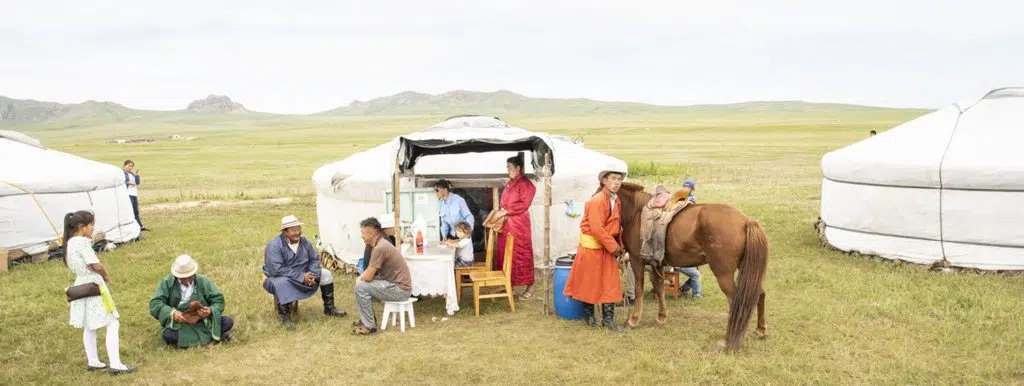Giving a “thumbs up” in the United States is a sign of approval, but it’s considered rude, or even obscene, in Iran, Greece and Russia. Who knew you could get yourself in trouble simply by making a slight hand gesture? Curious to learn what other signs are considered bad behavior around the world? Read more.
Every culture has its own set of cultural norms, or shared expectations of behavior. They can be as simple as saying “gesundheit” after sneezing or as deep-seated as the Torajan custom of living with the dead for a year. In Mongolia, there are a number of unique practices, traditions, and cultural norms. We explain them here:
Shaking hands after stepping on someone’s foot
Did someone just offer to shake someone’s hand, seemingly out of the blue? I t can only mean one thing—that person stepped on the other’s foot. In Mongolia, when you step on another’s foot, or feet, you immediately shake hands. It is a practice you will see all over Mongolia.
Choose gifts that face upward
When choosing a gift for a Mongolian, it is imperative that the gift opening face up. Upward-facing gifts are considered good luck, and thought to bring growth to the recipient, while downward-facing gifts can bring loss. This practice is most evident during Lunar New Year, when families traditionally give each other a pair of socks.
Don’t expect a reaction from the recipient
In Mongolia, recipients do not open gifts in front of the giver and do so in private at a later time.
Come to a Mongolian home very hungry
When invited to a Mongolian family’s home for a meal, arrive hungry, as guests are expected to eat a lot. No matter how many times you indicate you want a small portion, this request will fall on deaf ears and you’ll end up with overflowing bowls. It doesn’t end there—you are expected to ask for seconds!
Mongolians get up close and personal
Don’t be surprised when you meet a Mongolian for the first time and they come close to you, almost as if they are invading your sense of personal space. They mean no harm; it’s a cultural norm in a country where people live very close to each other. In Mongolia, it is not uncommon to see families sleeping in the same bed, see people sitting on someone’s lap in public transport, or see a man place his hands on another person’s shoulder when talking.
Mongolians like to joke around
Did your new Mongolian friend just make fun of you? That’s a good sign, since Mongolians use humor and harmless practical jokes as a way to get close to you and prove that they trust you.
But don’t change the plans suddenly
Go ahead and joke around, but don’t make any quick changes. If you want to make a change, do it very slowly and plan it methodically, because as a culture, they are not fond of change.
Say hello the oldest, or most important, first
When meeting a group of Mongolians, it is a must that you greet the oldest or the most important person within the group first.

In Mongolia, the elders are respected unconditionally. What an elder says, goes. For example, if a young boy is trampling the grass and an elder, even one previously unknown to the boy, scolds him for his behavior, the boy will immediately stop. All elders are considered with the utmost respect.
Multigenerational living is the norm in Mongolia
You will often find up to three generations living together under one roof in Mongolia, something Westerners often find interesting. It has been this way for many centuries, and as the elders age, the younger generations care for them.
Learning firsthand how we are all different and yet the same is one of the tenets of a journey with Nomadic Expeditions. We design culturally enriching journeys where you will not simply tick items off a must-see list, but you will have memorable, often once-in-a-lifetime, experiences and interactions with the people who define a place. Visit the Altai region of western Mongolia to meet the Kazakhs, one of the most fascinating ethnic minorities in the world, on our Golden Eagle Festival journey.

